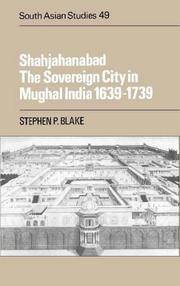| Listing 1 - 6 of 6 |
Sort by
|
Book
ISBN: 1474413196 Year: 2016 Publisher: Edinburgh University Press
Abstract | Keywords | Export | Availability | Bookmark
 Loading...
Loading...Choose an application
- Reference Manager
- EndNote
- RefWorks (Direct export to RefWorks)
Islamic astronomy --- Islamic astrology --- Islamic astrology. --- Islamic astronomy. --- History. --- Muslim astronomy --- Astronomy --- Astrology

ISBN: 0521390451 0521522994 0511563221 Year: 1990 Publisher: Cambridge [England] New York, NY, USA Cambridge University Press
Abstract | Keywords | Export | Availability | Bookmark
 Loading...
Loading...Choose an application
- Reference Manager
- EndNote
- RefWorks (Direct export to RefWorks)
From 1400 to 1750, Asian capital cities were often ruled in such a way that they became symbols of the power and influence their emperors extended over their states at large. These 'sovereign cities' became the empire in miniature. Shahjahanabad is the first study of a pre-modern Indian city (Old Delhi) as a sovereign city. Stephen Blake explores the way in which the emperors' and nobles' palaces and mansions dominated the landscape; how cultural life revolved around that of the emperors and their families; and how the households of the great men also dominated the urban economy and controlled a large percentage of state revenue. This study thus illuminates how Asian capitals were not the great amorphous agglomerations described by Marx and Weber. Instead they were urban communities with their own distinctive style and character, dependent on a particular kind of state organization.
Delhi (India) --- History --- Mogul Empire --- Urbanization --- India --- Delhi (India) - History. --- Mogul Empire - History. --- Urbanization - India - History. --- Arts and Humanities --- History. --- Cities and towns, Movement to --- Urban development --- Urban systems --- Cities and towns --- Social history --- Sociology, Rural --- Sociology, Urban --- Urban policy --- Rural-urban migration --- Mughal Empire
Digital
ISBN: 9780748649112 Year: 2016 Publisher: Edinburgh Edinburgh University Press
Abstract | Keywords | Export | Availability | Bookmark
 Loading...
Loading...Choose an application
- Reference Manager
- EndNote
- RefWorks (Direct export to RefWorks)
Article
Abstract | Keywords | Export | Availability | Bookmark
 Loading...
Loading...Choose an application
- Reference Manager
- EndNote
- RefWorks (Direct export to RefWorks)
Book
ISBN: 9781107030237 9781139343305 9781139612883 1139612883 9781139625906 113962590X 1139343300 9781139616607 1139616609 1283942992 9781283942997 1107030234 113961102X 1107237483 1139622188 1139609246 1108412807 9781107237483 9781139622189 9781139609241 Year: 2013 Publisher: Cambridge [etc.] Cambridge University Press
Abstract | Keywords | Export | Availability | Bookmark
 Loading...
Loading...Choose an application
- Reference Manager
- EndNote
- RefWorks (Direct export to RefWorks)
The prophet Muhammad and the early Islamic community radically redefined the concept of time that they had inherited from earlier religions' beliefs and practices. This new temporal system, based on a lunar calendar and era, was complex and required sophistication and accuracy. From the ninth to the sixteenth centuries, it was the Muslim astronomers of the Ottoman, Safavid and Mughal empires who were responsible for the major advances in mathematics, astronomy and astrology. This fascinating study compares the Islamic concept of time, and its historical and cultural significance, across these three great empires. Each empire, while mindful of earlier models, created a new temporal system, fashioning a new solar calendar and era and a new round of rituals and ceremonies from the cultural resources at hand. This book contributes to our understanding of the Muslim temporal system and our appreciation of the influence of Islamic science on the Western world.
Islamic calendar. --- Astronomy --- Time --- Islam and science --- Religious aspects --- Islam. --- History. --- Iran --- Mogul Empire. --- Turkey --- History --- Science and Islam --- Science --- Calendar, Islamic --- Muslim calendar --- Calendar --- Moghul Empire --- Mughal Empire --- Mugala Empire --- Ottoman Empire --- Ottoman Empire, 1288-1918 --- Arts and Humanities --- Mughal Empire.
Book
ISBN: 9780748649099 9780748649105 0748649107 0748649093 9780748649112 0748649115 1474413196 Year: 2016 Publisher: Edinburgh Edinburgh University Press
Abstract | Keywords | Export | Availability | Bookmark
 Loading...
Loading...Choose an application
- Reference Manager
- EndNote
- RefWorks (Direct export to RefWorks)
Surveys the contributions of Islamic astronomers and mathematicians to the development of astronomy and astrology.
Astronomy, Arab. --- Astrology, Arab. --- Islamic astronomy --- Islamic astrology --- History. --- RELIGION / Islam / History. --- Muslim astronomy --- Astronomy --- Astrology
| Listing 1 - 6 of 6 |
Sort by
|

 Search
Search Feedback
Feedback About UniCat
About UniCat  Help
Help News
News